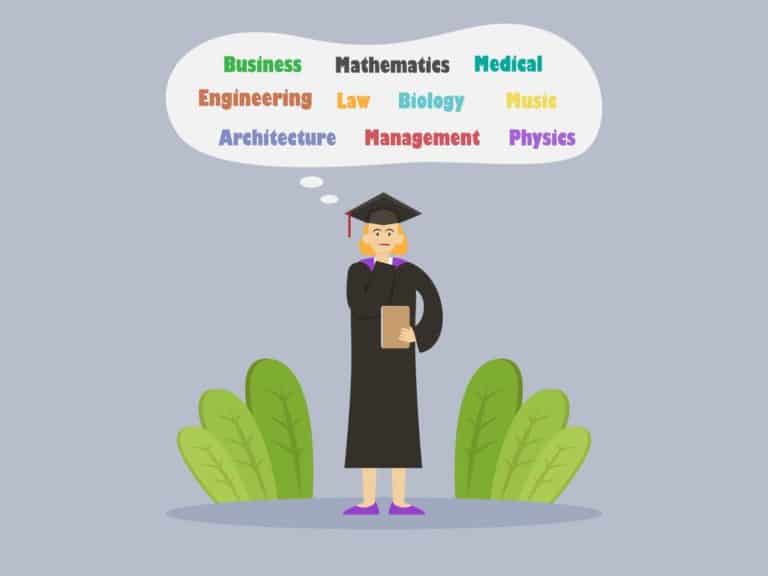What is a Major in College?
A major is an area of study an undergraduate student wishes to specialize in.
According to the National Center for Education Statistics, some of the most popular majors include business, health professions and related areas, social sciences and history, engineering, biomedical sciences and psychology.
Before anything else, let’s compare a college major with others that some college-bound teens may confuse it with — having a much better grasp of what a major is, may help them make college-related decisions much wiser.
| Category | Major | Minor | Concentration | Degree |
| Definition | The primary focus of study, often aligning with professional career interests | A secondary specialization that can complement a major or an interest/passion | A specialized area within the major | The level of education pursued and earned after completing all requirements including courses related to the major |
| Requirement | Usually required for undergraduate study | Optional | Must be related to the major | Requires declaring a major as it determines essential courses for completion |
| Diploma | May appear on the diploma | Does not appear on the diploma | – | Earned after completion of all courses, including major-specific ones |
| Relation to Major | N/A | Can be unrelated to the major | Directly related to the major, typically around 30% of the major’s requirements | Requires a major to determine essential courses, about one-third or one-half of all college courses |
| Career Focus | Should be in the area student wants to pursue professionally | Can be an exploration of interests or passions unrelated to professional goals | Focuses on giving specialized knowledge within the major’s field | Reflects the completion of a program of study including a major |
| Examples | Business, Engineering, Psychology | Music if majoring in Business, Spanish if majoring in Engineering | Entrepreneurship within a Business major | Bachelor of Arts, Bachelor of Science, depending on the major |
Declaring a Major
In most instances, undergraduate students are required by the colleges and universities they are attending to declare a major by the end of their sophomore year.
However, it’s not unlikely for some postsecondary institutions and programs, including competitive ones, to require students to decide on a major during the application process.
Undecided — it’s the term used to refer to students who apply to college and haven’t decided on a major yet.
Applying to college without any specific major in mind is far more common than one would think.
So much so that estimates say that about 20% to 50% of all students start their undergraduate careers undecided.
As mentioned earlier, undergrads usually have to commit to a major before the start of their junior year of college when their general education courses are already out of the way, thus allowing them to focus more on their major courses — related courses that have something to do with one’s chosen major.
This also gives students enough time to explore various electives and discover their interests.
However, it’s worth noting that some colleges and universities may require applicants to declare a major from the get-go, especially if they have to apply directly to a particular school or department.
Changing Majors
It’s possible for undergraduates to change majors at any time during their college careers.
As a matter of fact, as many as 50% to 75% of all college students switch to a different major at least once before finally earning a degree.
Although allowed, there are consequences to changing majors, especially if done incorrectly.
Certain courses or extracurricular or internship experiences may cause undergraduate students to develop another academic interest or professional goal, which happens to at least one-third of all degree-seeking individuals.
There are advantages to changing majors, and some of them are the following:
- Working on a degree that’s more aligned with one’s new career goal
- Having a more enjoyable and memorable college experience
- Getting higher grades for taking courses that the student is happier with
Alas, switching to a different major comes with some disadvantages, too, such as:
- Potentially delaying one’s graduation
- The likelihood of spending more on tuition and fees
- The risk of losing eligibility for departmental or merit-based scholarship
Generally speaking, the sooner you change majors, the less likely you are to remain in college for an extra semester or even two.
It’s also a wonderful idea to go for a major that has something to do with your current one in order to keep the number of completed major courses that may have to go to waste to a minimum.
Of course, it’s important to ask the financial aid office about what’s likely to happen to your aid award.
How Many Times Can You Change Your Major
Technically speaking, undergraduate students can change majors as many times as possible throughout their college careers.
On average, though, undergrads switch majors three times before earning their degrees.
Experts in higher education discourage students from changing majors during their junior and senior years, though they may still do so.
Transferring Colleges
Transfer students can change their majors when switching institutions.
According to Strayer University, it’s not uncommon for a college student to change his or her major and change his or her college at the same time.
The private for-profit institution, however, adds that one must determine beforehand whether the new school will accept credits from the previous school.
Hardest Majors
Some majors are harder than the rest.
The general consensus is that STEM majors are some of the most challenging ones.
However, it’s a must to consider the fact that a student’s level of interest and satisfaction in an area of discipline can also have an impact on the difficulty level of a particular major.
One study says that the average GPA of non-STEM majors is higher than STEM majors.
STEM majors must be that hard given that STEM students tend to have lower GPAs despite spending about 19 hours per week studying, while others spend less time studying, such as public relations majors (15 hours per week).
However, it’s also important to consider another study that says non-STEM students who change to STEM-related majors tend to have higher GPAs than undergrads who stick to being non-STEM majors — 3.18 vs. 3.0.
It’s safe to assume that students who switch to more difficult majors and still get higher grades than the rest must be really interested in their new majors.
But for reference only, let’s take a look at some of the hardest college majors based on the average GPA of students who take them as well as the average number of hours per week spent by students studying:
| Major | Average GPA | Average Study Hours a Week |
| Chemistry | 2.77 | 18.06 |
| Environmental economics and policy | 2.95 | 15.3 |
| Environmental earth science | 2.96 | 15.3 |
| American studies | 3.12 | 14.1 |
| Nuclear engineering | 3.14 | 17.17 |
| Energy Engineering | 3.15 | 17.17 |
| Astrophysics | 3.29 | 18.59 |
| Applied mathematics | 3.32 | 16.4 |
| Interdisciplinary studies | 3.33 | 13.63 |
| Genetics and plant biology | 3.35 | 16.7 |
| Marine science | 3.35 | 15.72 |
| Cognitive science | 3.35 | 14.82 |
| Political economy | 3.35 | 14.23 |
| South and Southeast Asian studies | 3.35 | 14.1 |
| Legal studies | 3.35 | 13.73 |
| Computer science | 3 | 10.5 |
Highest-Paying
The Association of Public & Land-Grant Universities (APLU) says that, on average, bachelor’s degree holders earn 84% more money per year than individuals whose highest educational qualification is a high school diploma.
Among those with a bachelor’s degree, meanwhile, some majors allow others to make more money than the rest.
Some of the top-paying majors are in the STEM field. On the other hand, around 50% of all majors that make the most money are engineering subsets. Needless to say, what you major in can have a considerable impact on your earning potential.
The following are the highest-paying majors:
| Major | Early Career Pay (0 to 5 Years of Experience) |
| Physician assistant studies | $109,600 |
| Operations research and industrial engineering | $98,300 |
| Petroleum engineering | $97,500 |
| Nuclear engineering technology | $92,500 |
| Operations research | $92,200 |
| Metallurgical engineering | $90,800 |
| Computer science and engineering | $90,500 |
| Computer engineering | $89,100 |
| Aeronautics and astronautics | $88,200 |
| Electrical and computer engineering | $88,100 |
| Marine engineering | $87,900 |
| Robotics | $87,900 |
| Mining engineering | $87,400 |
| Systems engineering | $87,000 |
| Electronic systems technology | $86,900 |
| Welding engineering | $86,600 |
| Chemical and biomolecular engineering | $86,000 |
| Computational and applied mathematics | $85,700 |
| Chemical engineering | $85,600 |
| Computer science | $85,400 |
| Nuclear engineering | $85,200 |
| Paper science | $84,900 |
| Electrical engineering | $84,900 |
| Electrical power engineering | $84,700 |
Disclaimer: The views and opinions expressed in this article are those of the authors and do not necessarily represent those of the College Reality Check.





